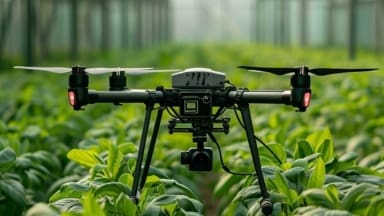
The new report by the Horticultural Trades Association (HTA), The Opportunity for Mechanisation and Automation in UK Environmental Horticulture, summarises the scope of UK plant and tree production and show potential opportunities for researchers and providers of innovative new technologies to collaborate with the forward-looking environmental horticulture sector. This is crucial to secure greener growth for the UK in the coming years.
The report includes sections on “Environmental Horticulture in the UK”, “Growth Potential for the Sector and Labour Challenges”, and “Technological Solutions”, as well as case studies from HTA members, J & A Growers in Warwickshire and Hilliers Nurseries Ltd in Hampshire.
Fran Barnes, HTA Chief Executive, said: “The environmental horticulture industry is at a pivotal time of transition as we prepare ourselves for the future. With ambitious governmental environment targets, our sector needs support to evolve with technological advancements in order to help the UK reach its environmental goals. Our report shows the clear possibility of accelerating growth.
“As a sector, environmental horticulture isn’t alone in facing a rising wage bill and challenges in recruitment. Still, growers are increasingly looking to automate and mechanise to sustainably upscale production to meet this increased demand and ensure the Government can deliver on its challenging environmental targets.
“The UK’s growers produce ornamental plants and trees valued at £1.7 billion annually, enriching over 20 million gardens, parks, and green spaces, and demand is only set to rise. By investing in automation, innovation, and sustainable practices, we can meet this demand while addressing resource challenges such as labour, water, and energy. The HTA continues to support its members in gaining investment in new technologies to enable greater productivity, ensuring the UK has the strategic capacity to grow the plants and trees it needs in the future.”
The HTA Market Research Manager, Laura Jeffrey added: “The plants and trees produced in the UK by commercial growers are increasingly being recognised for the role they have to play in improving the nation’s health and wellbeing and mitigating the effects of climate change. The pool of people in the core hobby gardening demographics is also set to grow in the years to come as the UK population ages, further increasing the demand for plants and trees.
“The appetite for mechanisation and automation technology in environmental horticulture production is strong, and many processes could or, to some extent, already are being automated, as the case studies in our report highlight. However, the researchers and providers of these innovative technologies need to engage with the sector and have government backing and support for what is a significant business investment. Our report aims to provide ‘food for thought’ to encourage engagement across all parties and secure ‘green growth’ for the UK in the coming years.”
The HTA’s inaugural FutureGrow Expo, showcasing innovative technology to transform business productivity and sustainability, is taking place today at Stoneleigh Park in Kenilworth.

